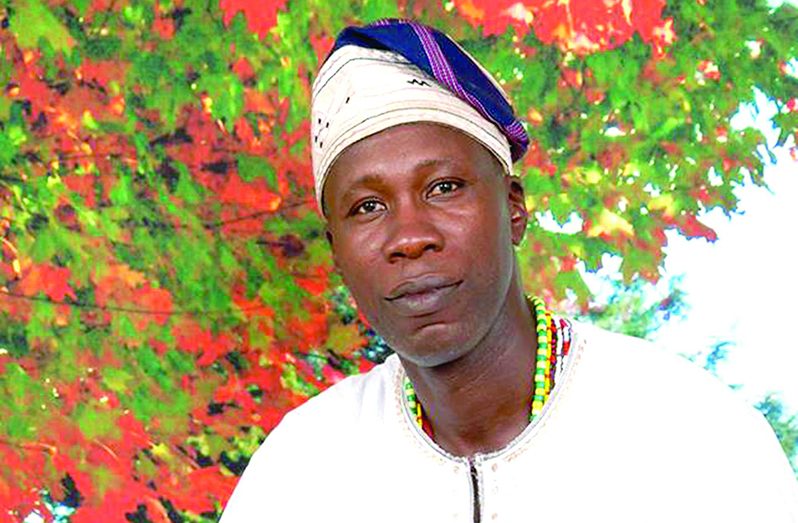— says senior psychologist
ALTHOUGH stress and anxiety may arise in your workplace and personal life, there are many simple ways of reducing the pressure by using exercise, mindfulness, music, and physical intimacy to improve your overall work-life balance in the process.
This is according to senior psychologist at the Mental Health Unit of the Health Ministry, Mr. Balogun Osunbiyi during a symposium on Friday with nurses of the National Insurance Scheme (NIS), as part of their activities to observe World Nurses Day.
The training was held in the Training Room of the Patrick Martinborough Multi-Purpose Complex on Carifesta Avenue, here in Georgetown, and saw 16 nurses going through the paces on location, and 24 others joining them on the Zoom virtual platform. Other persons in attendance were NIS rehabilitation and other ancillary staffers.

Under the theme, “Negative Psychological Impact of the COVID-19 Pandemic on Nursing Staff”, Osunbiyi told participants that having strong social ties may help them get through stressful times and lower their risk of anxiety. Noting that one study has found that men and women with fewer social connections are more likely to suffer from depression and anxiety, the senior government mental health official said, “Social support from friends and family can help you get through stressful times; being part of a friend network gives you a sense of belonging and self-worth, which can help you in tough times.”
Using the findings of another survey to bolster his argument, Osunbiyi said: “One study found that for women in particular, spending time with friends and children helps release oxytocin, a natural stress reliever. This effect is called ‘tend-and-befriend’, and is the opposite of the ‘fight-or-flight’ response.”
As to how he perceives wellness, the veteran psychologist said: “It is a state of complete physical, mental, and social well-being, and not merely the absence of disease or infirmity.” Noting that there is a sight more to wellness than meets the eye, in that it can range from emotional, to environmental, intellectual, physical, social and spiritual, Osunbiyi went on to explain that well-being is not just the absence of disease or illness, but rather is a complex combination of a person’s physical, mental, emotional, and social health factors. Well-being, he said, is strongly linked to happiness and life satisfaction. In short, well-being could be described as how you feel about yourself and your life.
COMBATTING STRESS
Exercise, he said, is also one of the most important ways of combatting stress, and that contradictory as it might seem, putting physical stress on your body through exercise can do a lot to relieve mental stress. Noting also that the benefits are strongest when you exercise regularly, Osunbiyi said that people who exercise regularly are less likely to experience anxiety than those who don’t exercise at all.
As he explained: “There are a few reasons behind this: Exercise lowers your body’s stress hormones, such as cortisol, in the long-run; it also helps release endorphins, which are chemicals that improve your mood, and act as natural painkillers.
“Exercise can also improve your sleep quality, which can be negatively affected by stress and anxiety. When you exercise regularly, you may feel more competent and confident in your body, which, in turn, promotes mental well-being. Try to find an exercise routine or activity you enjoy, such as walking, dancing, rock climbing or yoga.”
He also talked a bit about the benefits of aromatherapy, the science behind using essential oils and other aromatic compounds to promote health and well-being, saying that it can help to significantly lower anxiety and stress. And so too, he said, can using certain supplements, such as Ashwagandha, a small evergreen shrub native to India, the Middle East and parts of Africa, and omega-3 oils, green tea, and lemon balm.
Underscoring that it is important to not take on more than you can handle, and that saying no is one way of controlling your stressors, the senior psychologist said that while not all stressors are within one’s control, some are. “Take control over the parts of your life that you can change, and are causing you stress. One way to do this may be to say “no” more often,” Osunbiyi said, adding: “This is especially true if you find yourself taking on more than you can handle, as juggling many responsibilities can leave you feeling overwhelmed. Being selective about what you take on, and saying no to things that will unnecessarily add to your load can reduce your stress levels.”
EVER MINDFUL
Participants were also exposed to the practice of “mindfulness”, which can help lower symptoms of anxiety and depression.
Mindfulness, Osunbiyi explained, is a practice that anchors you to the present moment, in that it can help combat the anxiety-inducing effects of negative thinking.
“There are several methods for increasing mindfulness, including mindfulness-based cognitive therapy, mindfulness-based stress reduction, yoga and meditation,” he said, adding: “A recent study among college students suggests that mindfulness may help increase self-esteem, which, in turn, lessens symptoms of anxiety and depression.” Osunbiyi also pointed out that positive touch from cuddling, hugging, kissing and sex, or even listening to music may help lower stress, by releasing oxytocin, and lowering blood pressure. “Cuddling, kissing, hugging and sex can all help relieve stress. Positive physical contact can help release oxytocin and lower cortisol.
This can help lower blood pressure and heart rate, both of which are physical symptoms of stress,” he said, adding: “Listening to music can have a very relaxing effect on the body. Slow-paced instrumental music can induce the relaxation response by helping lower blood pressure and heart rate, as well as stress hormones.
Noting that some types of Classical, Celtic, Native American and Indian music can be particularly soothing, Osunbiyi said that simply listening to the music you enjoy can be effective, too. And, because the sounds of nature can have a rather calming effect on one, he said, “This is why they’re often incorporated into relaxation and meditation music.” As to the therapeutic benefits of spending time with one’s pet, he said: “Having a pet may help reduce stress, and improve your mood. Interacting with pets may help release oxytocin, a brain chemical that promotes a positive mood. Having a pet may also help relieve stress, by giving you purpose, keeping you active and providing companionship, all qualities that help reduce anxiety.”




.jpg)










